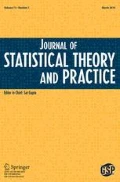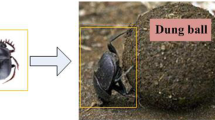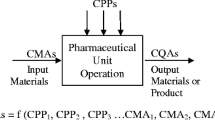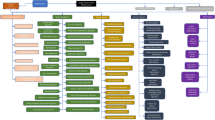Abstract
Robust design optimization methods applied to real life problems face some major difficulties: how to deal with the estimation of probability densities when data are sparse, how to cope with high dimensional problems and how to use valuable information in the form of unformalized expert knowledge. In this paper we introduce in detail the clouds formalism as a means to process available uncertainty information reliably, even if limited in amount and possibly lacking a formal description. This enables a worst-case analysis with confidence regions of relevant scenarios which can be involved in an optimization problem formulation for robust design.
Similar content being viewed by others
References
Alexandrov, N.M., Hussaini, M.Y., 1997. Multidisciplinary design optimization: State of the art. In Proceedings of the ICASE/NASA Langley Workshop on Multidisciplinary Design Optimization.
Berleant, D., Cheng, H., 1998. A software tool for automatically verified operations on intervals and probability distributions. Reliable Computing, 4(1), 71–82.
Destercke, S., Dubois, D., Chojnacki, E., 2007. Relating practical representations of imprecise probabilities. In Proceedings of the 5th International Symposium on Imprecise Probability: Theories and Applications. Prague, Czech Republic.
Dubois, D., Prade, H., 1986. Possibility Theory: An Approach to Computerized Processing of Uncertainty. New York: Plenum Press.
Dubois, D., Prade, H., 2005. Interval-valued fuzzy sets, possibility theory and imprecise probability. In Proceedings of International Conference in Fuzzy Logic and Technology.
Ferson, S., 1996. What monte carlo methods cannot do? Human and Ecological Risk Assessment, 2, 990–1007.
Ferson, S., 2002. Ramas Risk Calc 4.0 Software: Risk Assessment with Uncertain Numbers. Lewis Publishers, U.S.
Fuchs, M., Girimonte, D., Izzo, D., Neumaier, A., 2008. Robust Intelligent Systems, chapter Robust and Automated Space System Design, in press. Springer. Preprint available on-line at: http://www.martin-fuchs.net/publications.php.
Grant, M.C., Boyd, S.P., 2007. CVX: A system for disciplined convex programming. http://www.stanford.edu/~boyd/cvx/cvx_usrguide.pdf, http://www.stanford.edu/~boyd/cvx/
Koch, P.N., Simpson, T.W., Allen, J.K., Mistree, F., 1999. Statistical approximations for multidisciplinary optimization: The problem of size. Special Issue on Multidisciplinary Design Optimization of Journal of Aircraft, 36(1), 275–286.
Kolmogoroff, A., 1941. Confidence limits for an unknown distribution function. The Annals of Mathematical Statistics, 12(4), 461–463.
Kreinovich, V., 1997. Random Sets: Theory and Applications, chapter Random sets unify, explain, and aid known uncertainty methods in expert systems, 321–345. Springer-Verlag.
Lewis, K., Mistree, F., 1997. Modeling interactions in multidisciplinary design: A game theoretic approach. AIAA Journal, 35(8), 1387–1392.
McCormick, D.J., Olds, J.R., 2002. A distributed framework for probabilistic analysis. In AIAA/ISSMO Symposium On Multidisciplinary Analysis And Design Optimization.
McKay, M., Conover, W., Beckman, R., 1979. A comparison of three methods for selecting values of input variables in the analysis of output from a computer code. Technometrics, 221, 239–245.
Neumaier, A., 2004. Clouds, fuzzy sets and probability intervals. Reliable Computing 10, 249–272. http://www.mat.univie.ac.at/~neum/ms/cloud.pdf
Neumaier, A., Fuchs, M., Dolejsi, E., Csendes, T., Dombi, J., Banhelyi, B., Gera, Z., 2007. Application of clouds for modeling uncertainties in robust space system design. ACT Ariadna Research ACT-RPT-05-5201, European Space Agency. Available on-line at http://www.esa.int/gsp/ACT/ariadna/completed.htm
Oberguggenberger, M., King, J., Schmelzer, B., 2007. Imprecise probability methods for sensitivity analysis in engineering. In Proceedings of 5th International Symposium on Imprecise Probability: Theories and Applications. Prague, Czech Republic.
Press, W.H., Teukolsky, S.A., Vetterling, W.T., Flannery, B.P., 1992. Numerical recipes in C. Cambridge University Press, 2nd edition.
Regan, H., Ferson, S., Berleant, D., 2004. Equivalence of methods for uncertainty propagation of real-valued random variables. International Journal of Approximate Reasoning, 36(1), 1–30.
Ross, T.J., 1995. Fuzzy Logic with Engineering Applications. New York, McGraw-Hill.
Williamson, R.C., 1989. Probabilistic Arithmetic. Ph.D. thesis, University of Queensland.
Author information
Authors and Affiliations
Corresponding author
Rights and permissions
About this article
Cite this article
Fuchs, M., Neumaier, A. Potential Based Clouds in Robust Design Optimization. J Stat Theory Pract 3, 225–238 (2009). https://doi.org/10.1080/15598608.2009.10411922
Received:
Revised:
Published:
Issue Date:
DOI: https://doi.org/10.1080/15598608.2009.10411922




